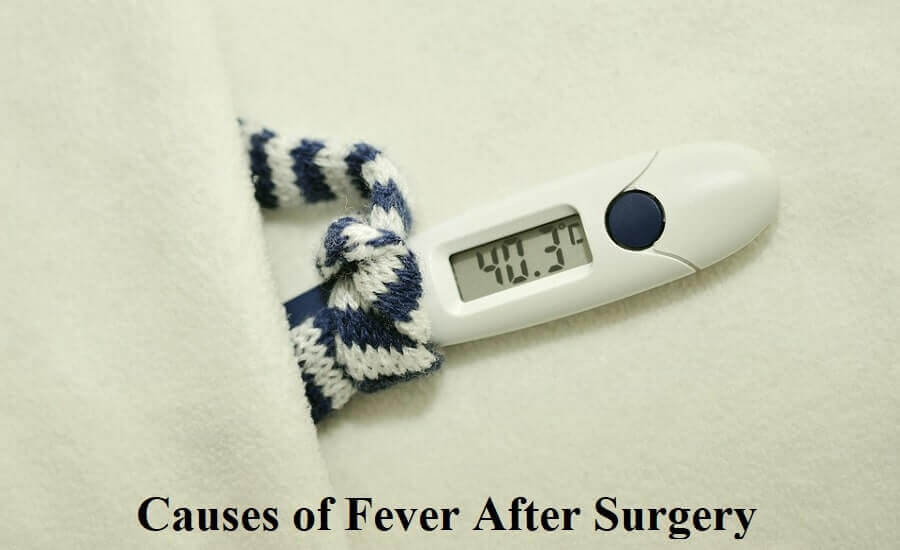The surgical procedure is for sure a restless experience that marks stress, anxiety, and even fever as it is after effect. Most of the patients come up with this complaint of feeling a higher temperature than usual after surgery.
Mostly the fever occurs within 48 hours after surgery. Doctors usually call a fever after surgery a normal after effect unless it turns out into a critical illness.
Table of Contents
Normal After Effects of Surgery
Although Surgery is the process that comes with different aftereffects depending upon different factors, one can’t neglect the relief and good health surgery brings later on.
Following are the after-effects that are faced by nearly everyone who undergoes surgery.
- Restlessness
- Thirst
- Sore throat
- Sleeplessness
- Depression
- Swelling around the incision site
These aftereffects of the surgery are normal even a doctor or surgeon would tell you about these after-effects. Hence, you don’t need to panic.
Causes of Fever After Surgery

The most possible cause of the fever after surgery is that tissues and cells of the body get seriously traumatized.
Hence, the fever after the surgery could have the following causes. In the medical discourse, these causes are referred to as 5Ws.
1. Wind
It is the first phase after surgery. The wind shows its occurrence in the form of respiratory problems within 24 or 48 hours after the surgery.
Atelectasis is the most common breathing complication which may be because the patient spent most of the time lying in the bed that leads to incomplete expansion of the lungs.
Hence an incentive spirometer is prescribed to the patient who has undergone lung surgery.
2. Water
The fever that occurs in the form of Urinary Tract Infection is another common cause that occurs after two or three days of surgery. Surgery causes the person to lose the bladder control of the system temporally.
The symptoms of UTI are fever and urinary urgency after 3 to 5 days of surgery possible.
3. Wonder Drugs
The patients are numbed with drugs or some other medication before the surgery. Sometimes these drugs don’t go quite with the system of the person undergoing the surgery that is why the body develops a fever. Such a fever can develop any time after the surgery.
4. Wound
when the postsurgical patient develops a fever after 5 to 7 days the cause may be the infection in the wound. You would notice warmness over the surgical part of your body.
Our body’s temperature increases to fight the pain that the wound is causing which may also indicate that the wound has infected. Such fever needs to be addressed immediately by the doctor.
5. Walking
Another complication that shows a deep vein thrombosis is referred to as walking. The situation could get alarming when these clots in veins get deeper enough that they could travel from the legs to the heart. That is why post-surgical patients with DVT are advised not to indulge much in physical activities.
Other Possible Causes of Fever After Surgery
There could be several other causes or factors that can contribute to a fever after surgery. These possible factors could be prior tissue inflammation, the patient’s age, duration of surgery, and location of surgery. The tissues get damaged during the surgical process and the rate of damage depends on the type of the surgery.
Symptoms that Indicate a Serious Problem
Most people don’t have to face any serious aftereffects of surgery because Doctors try their best to assess the situation properly so that a patient may not undergo any serious aftereffects of the surgery.
However, if a patient develops a serious fever after surgery, he/she should immediately concern the doctor. Beware of the following serious symptoms.
- Persistent pain that gets worse by the time instead of getting any better even with the prescribed antibiotics you need to take immediate action.
- The fever gets higher than 101-degree Fahrenheit is not at a normal post-surgical effect. It indicates the underlying complications.
- Vomiting or diarrhea is another serious symptom that needs medical attention. Don’t use any medicines on your own in such a situation.
- The post-surgical patient may face constipation for days or weeks which is again an alarming situation as a precautionary measure you could increase the intake of fluid but it’s not the permanent solution to your problem.
- The severe shortness of breath needs an immediate doctor’s consultation.
- The discharge of sticky fluid is the normal healing process until the color of that discharge is yellow. The situation gets complicated when the color changes to oozes green and spreads a foul-smelling.
- Painful urination is another serious symptom that people develop after surgery.
- A severe drop in blood pressure can cause deceleration of the flow of blood in the entire body. Such a situation would require a doctor’s prescription to normalize the blood pressure.
Never take these symptoms lightly and address these to a doctor before the thing gets worse and even not in control of the doctor or surgeon.
Prevention of a Fever After Surgery
We have already discussed that the cause of the fever might be related to the person’s system that could lead him/her to complications. However, a patient with a normal system who doesn’t have any traumatic history other than surgery could prevent fever after surgery by following precautions.
- It is always recommended that the patient should wash their entire body one day before the surgery.
- Smoking brings no good to you in fact, it increases the risk of infection. Hence you should quit smoking for your own good.
- The doctors always advise a patient with particular care measures or instructions, you need to follow those instructions.
- Keep the number of your doctor or consultant on your phone so that you can connect to them immediately if you develop a fever after surgery.
- Take good care of your hygiene and even the people around a surgical patient should be careful that they wash their hands before and after meeting the patient.
Conclusion
Consulting your doctor is the best possible solution you’ve got in case of fever after surgery. If the fever is normal, you’d be prescribed antibiotics to treat the infection and if it gets serious it could indicate some underlying problem. Hence, you would require immediate treatment.


















